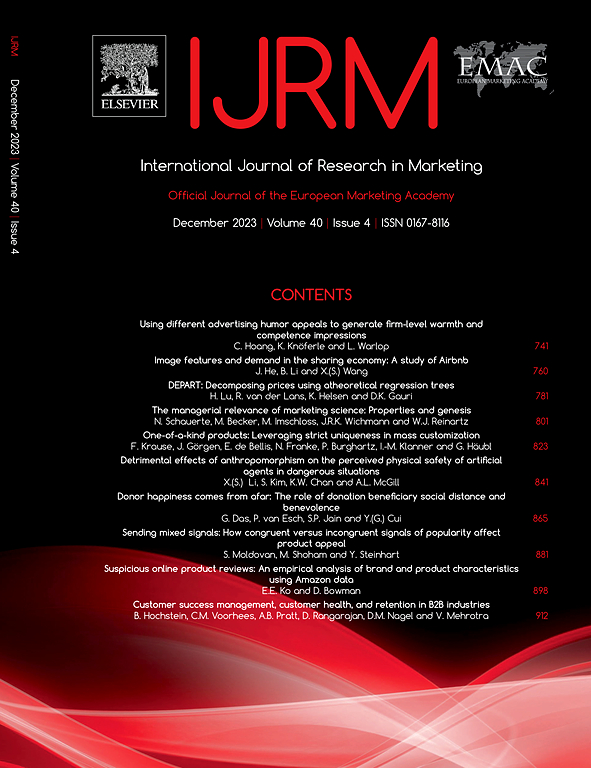Value outcomes in Airbnb as a chronotopic service
IF 7.5
2区 管理学
Q1 BUSINESS
International Journal of Research in Marketing
Pub Date : 2025-03-01
DOI:10.1016/j.ijresmar.2024.05.008
引用次数: 0
Abstract
Many types of consumption—including events, traveling, and accommodation—primarily focus on selling time in space to consumers. That is, their business model is based on charging consumers for spending time in provided spaces (or places), with prices varying depending on the type of space and how much time consumers spend in that space. Using Bakhtin’s notion of chronotopes, we develop the concept of chronotopic services to describe these types of services that primarily sell time-in-space to consumers. Airbnb is an example of a chronotopic service. In a six-year multimethod qualitative study of consumers’ experiences with Airbnb we examine how such chronotopic services occur and how they shape consumption value outcomes in Airbnb. We conceptualize chronotopic services by noting three affordances that characterize Airbnb—temporal, spatial, and spatiotemporal affordances. We show how these three chronotopic affordances enable the orchestration of consumption value outcomes through heterotemporality, heterotopia, and hybridity. We contribute to services and consumer research on the role of space and time in the consumption of services by demonstrating how chronotopic affordances shape consumption outcomes and consumer experiences. This research also highlights the implications of the time-in-space aspects of chronotopic services and how value is created and destroyed because of its chronotopic nature. We discuss the implications of our findings for understanding the consumption of other chronotopic services and how chronotopic affordances shape other forms of consumption.
作为时序服务的 Airbnb 的价值成果
许多类型的消费——包括活动、旅行和住宿——主要集中在向消费者出售时间和空间。也就是说,他们的商业模式是基于向消费者在提供的空间(或地点)中花费的时间收费,价格根据空间类型和消费者在该空间中花费的时间而变化。利用巴赫金的时位概念,我们发展了时位服务的概念来描述这些主要向消费者出售空间时间的服务类型。Airbnb就是一个按时服务的例子。在一项为期六年的消费者使用爱彼迎体验的多方法定性研究中,我们研究了这种分时服务是如何发生的,以及它们如何影响爱彼迎的消费价值结果。我们通过注意到airbnb的三个特征——时间、空间和时空的能力,来概念化分时服务。我们展示了这三种时位功能如何通过异时性、异托邦和杂交性来实现消费价值结果的协调。我们为服务和消费者研究空间和时间在服务消费中的作用做出了贡献,展示了时间差的能力如何影响消费结果和消费者体验。本研究还强调了随时异变服务的时空含义,以及随时异变服务的价值是如何被创造和破坏的。我们讨论了我们的研究结果对理解其他分时服务的消费以及分时功能如何影响其他形式的消费的影响。
本文章由计算机程序翻译,如有差异,请以英文原文为准。
求助全文
约1分钟内获得全文
求助全文
来源期刊
CiteScore
11.80
自引率
4.30%
发文量
77
审稿时长
66 days
期刊介绍:
The International Journal of Research in Marketing is an international, double-blind peer-reviewed journal for marketing academics and practitioners. Building on a great tradition of global marketing scholarship, IJRM aims to contribute substantially to the field of marketing research by providing a high-quality medium for the dissemination of new marketing knowledge and methods. Among IJRM targeted audience are marketing scholars, practitioners (e.g., marketing research and consulting professionals) and other interested groups and individuals.

 求助内容:
求助内容: 应助结果提醒方式:
应助结果提醒方式:


